AI tutors are reshaping education in 2025, offering personalized, 24/7 learning support for students. While only 22% of classrooms currently use AI, parents and educators are increasingly interested in these tools. Popular platforms like Cognispark AI, Coursebox, and Khanmigo provide tailored lessons, instant feedback, and support for diverse subjects, from STEM to language arts. These tools are affordable alternatives to traditional tutoring, with features like adaptive learning, interactive content, and accessibility options for various needs. Families can explore free trials to find the best fit for their children, ensuring a smoother back-to-school experience.
The AI Tutor That Thinks, Listens, Talks, and Teaches Like Never Before | The AI Show @ ASU+GSV 2025

1. Cognispark AI
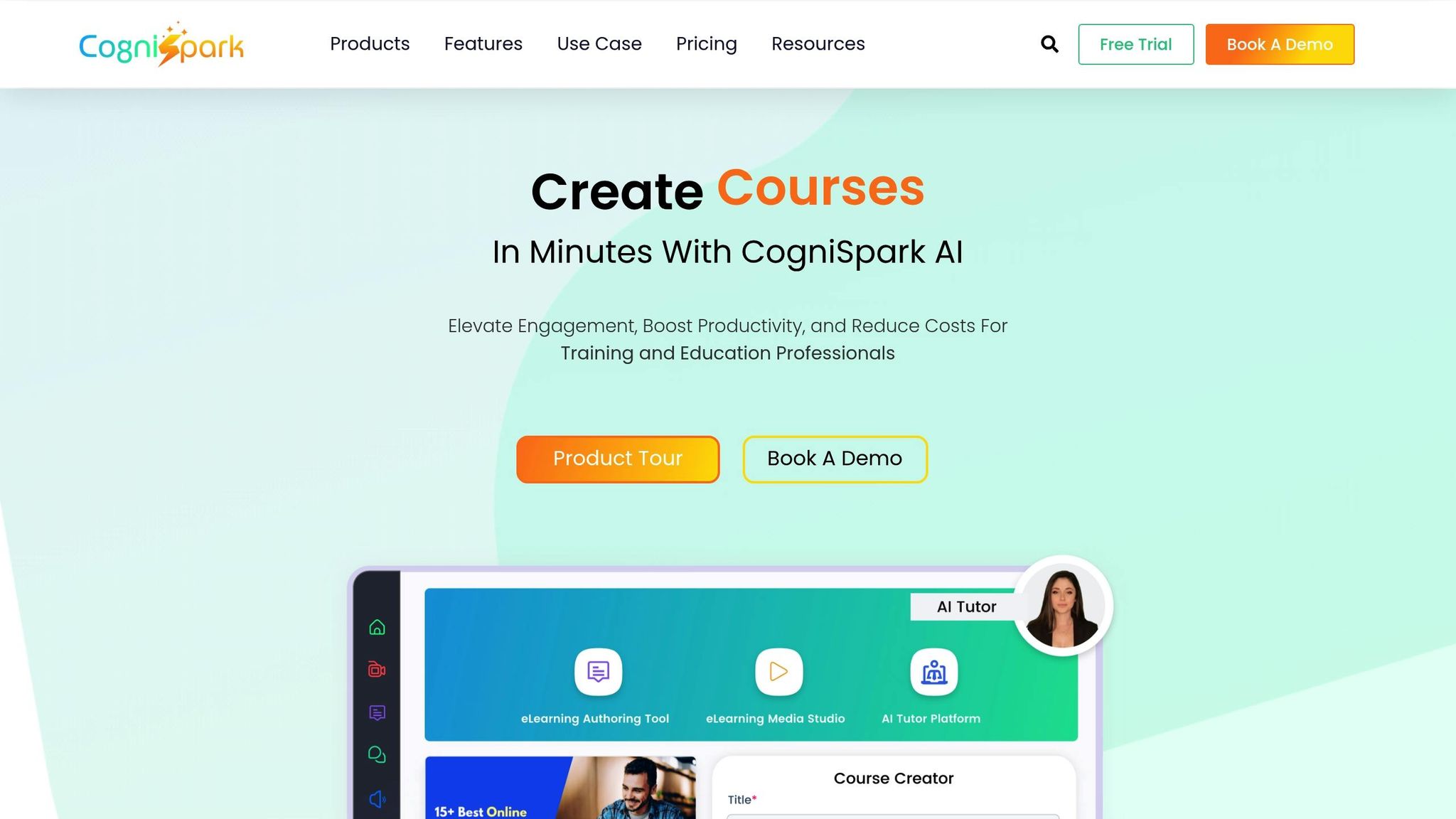
Cognispark AI is a dynamic learning platform that merges AI-driven course creation with tutoring features. Designed to support educators and parents, it enables the development of interactive and personalized learning experiences tailored to each student's needs.
This platform serves a dual purpose: it acts as a content creation tool and an AI tutor. Educators and parents can design custom, goal-oriented courses, while students enjoy lessons narrated by AI-generated voiceovers that sound natural and engaging. The AI Spokesperson Video Generator adds another layer of interactivity by creating personalized video content featuring virtual instructors who visually explain complex topics. To top it off, the platform offers unlimited practice opportunities through AI tools, allowing students to learn at their own pace.
A standout feature of Cognispark AI is its cloud-based storage system, which ensures learning materials are accessible from any device, anywhere. Additionally, the platform integrates seamlessly with Learning Management Systems (LMS) like Paradiso, creating a structured and interactive training environment for users. Below is a breakdown of its pricing options.
Pricing (USD)
The platform offers several pricing tiers, each with distinct features to meet various needs:
| Plan | Monthly Price | Annual Price | Key Features |
|---|---|---|---|
| Free | $0 | $0 | 14-day trial, 1 author, unlimited AI tool access |
| Basic | $64/user | $49/user | 5 AI courses, 10 manual courses, 10GB storage |
| Premium | $129/user | $99/user | 15 AI courses, 30 manual courses, 350GB storage |
| AI Tutor | $69/user | $49/user | Dedicated tutoring features |
| Enterprise | Contact for pricing | Contact for pricing | Custom solutions |
For the AI Tutor plan, additional setup and training costs apply. Families should also account for the expense of a compatible LMS, as Cognispark AI works best when paired with platforms like Paradiso for a fully interactive experience.
Accessibility
Cognispark AI’s cloud-based design ensures students can access their materials on tablets, laptops, or desktop computers. The AI voiceover feature is particularly helpful for students with reading challenges or visual impairments, while the video generation tool supports those who learn better through visual instruction. Keep in mind that full functionality depends on integration with an LMS.
2. Coursebox
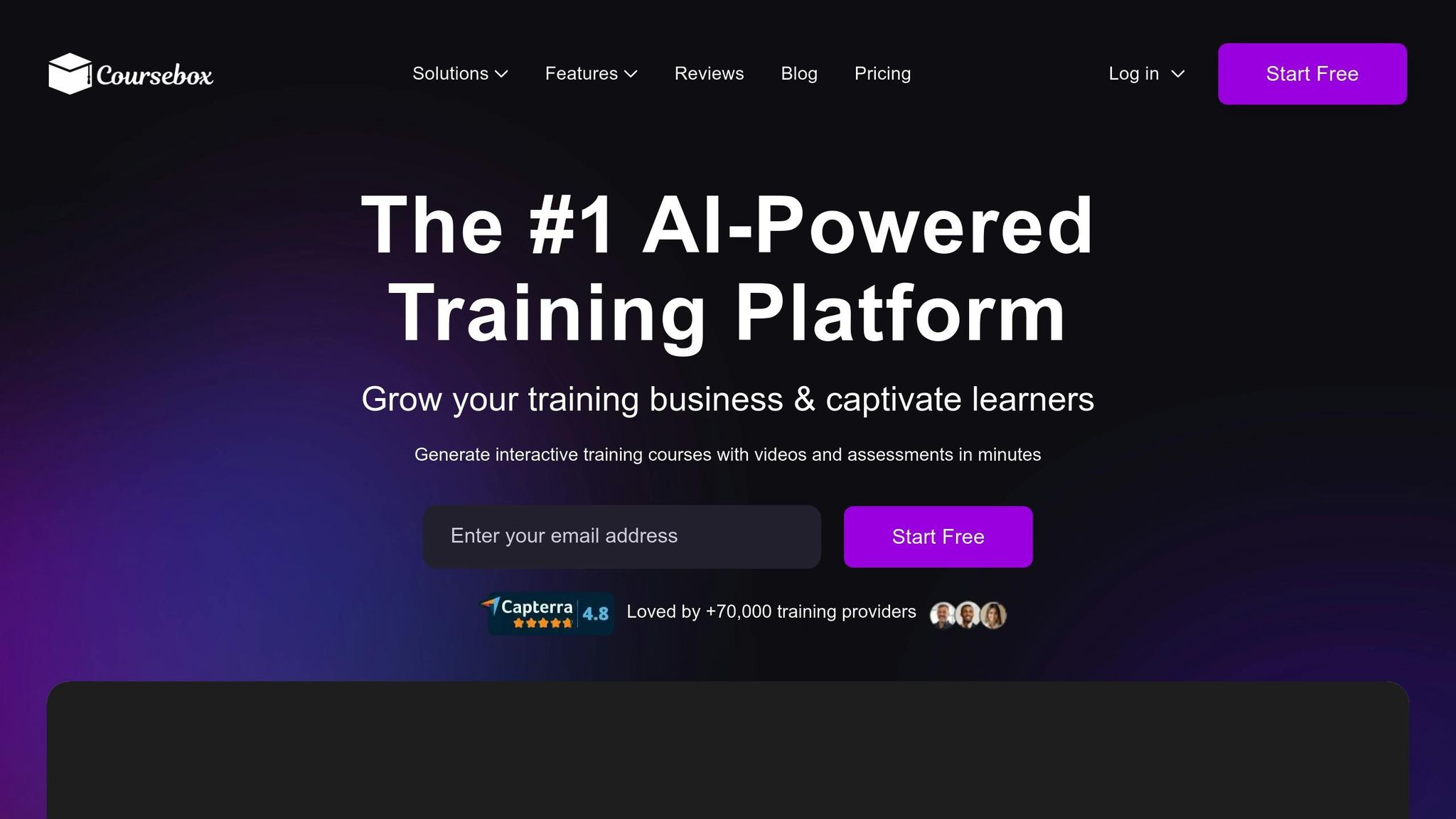
Coursebox reimagines how educators and students approach learning by creating full courses from just a brief prompt. It’s a game-changer for busy parents and teachers, offering complete educational content in mere minutes - perfect for gearing up for the school year. This efficiency highlights Coursebox’s ability to simplify and enhance the learning experience.
Its AI Course Generator delivers structured lessons, quizzes, and assessments based on short descriptions. The platform also provides interactive content, automated feedback, and grading tools, helping students pinpoint areas for improvement without waiting for manual corrections.
Core Features
Coursebox is packed with features that make it ideal for back-to-school prep. One of its standout tools is Rapid Course Creation, which generates full courses in under an hour. By analyzing user input, the AI creates structured lessons enriched with multimedia, practice exercises, and progress checks.
The Smart Assessment Builder customizes quizzes and tests to align with course content. It even adjusts the difficulty of these assessments based on how students perform, ensuring the right level of challenge for each learner. Collaboration tools allow teachers and parents to monitor progress together through shared dashboards and detailed reports.
Students can access their courses on mobile devices or computers, with the option to download materials for offline use. The platform supports various learning styles with content formats like text, video explanations, and interactive exercises, making it versatile and user-friendly.
Pricing
| Plan | Monthly Price | Annual Price | Key Features |
|---|---|---|---|
| Free | $0 | $0 | 3 AI courses, basic templates, 100 students |
| Pro | $39/month | $29/month | Unlimited AI courses, advanced analytics, 1,000 students |
| Team | $99/month | $79/month | Multi-user access, white-label options, 5,000 students |
| Enterprise | Custom pricing | Custom pricing | Unlimited users, API access, dedicated support |
The Free plan is a great starting point for families with one or two children, offering a taste of AI-powered learning. For schools or larger families, the Pro plan offers more value by removing course limits and adding advanced tracking tools.
Supported Subjects
Coursebox covers a broad range of K-12 subjects. In STEM, it offers mathematics (from basic arithmetic to calculus), science courses (biology, chemistry, and physics), and computer science fundamentals, including coding.
Language arts options include reading comprehension, writing, grammar, and literature analysis. In social studies, the platform provides content on history, geography, civics, and cultural studies. Younger students benefit from foundational skills in phonics, early math concepts, and introductory science.
For test preparation, Coursebox stands out by generating practice materials for standardized tests like the SAT and AP exams. It also supports foreign language learning, with interactive exercises and pronunciation guides for languages such as Spanish, French, and German.
Accessibility
Coursebox emphasizes inclusive learning with a range of accessibility features. It includes text-to-speech functionality for students with dyslexia or visual impairments. Adjustable font sizes and color contrasts cater to various visual needs.
The platform’s mobile-responsive design ensures a smooth experience on tablets and smartphones, while offline access allows students to download materials for times when internet access isn’t available. Progress sync ensures students can switch between devices without losing their place. Additional features like keyboard navigation and screen reader support make the platform accessible to students with motor disabilities.
3. Mindgrasp AI
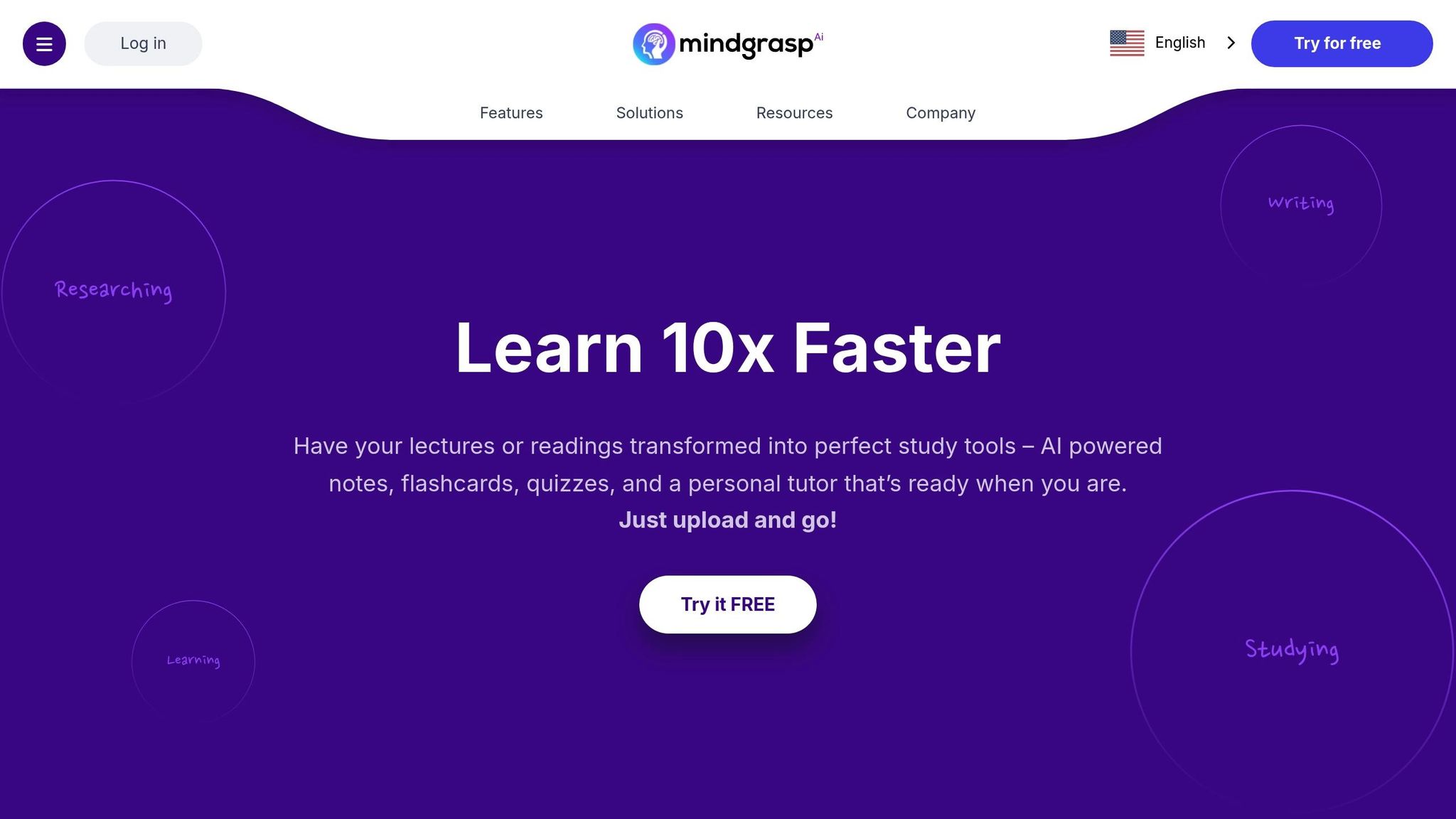
Mindgrasp AI transforms how students absorb and retain educational material by turning lecture videos, textbooks, and research papers into clear, personalized study tools. It's a great resource for gearing up for the school year.
Core Features
Mindgrasp AI works with a variety of formats - PDFs, audio, video, and web articles - so students can study in the way that suits them best. Its AI Math Expert tackles STEM problems step by step, making complex topics easier to grasp. This versatility extends across a wide range of subjects, as outlined below.
Supported Subjects
Mindgrasp AI caters to diverse academic needs by simplifying intricate STEM equations, breaking down tough scientific concepts, and clarifying literary texts. It’s designed for learners at all levels, from high school to graduate studies. Currently, it’s a trusted tool for thousands of students across hundreds of schools and universities in over 128 countries.
Accessibility
To make learning more inclusive, Mindgrasp AI offers multi-language support, providing explanations in a student’s preferred language. This feature is especially helpful for non-native English speakers. The platform also supports multiple content formats, allowing students to engage in the way they find most effective. Since it’s web-based, it works smoothly on any device without requiring special software installations.
4. MagicSchool.ai
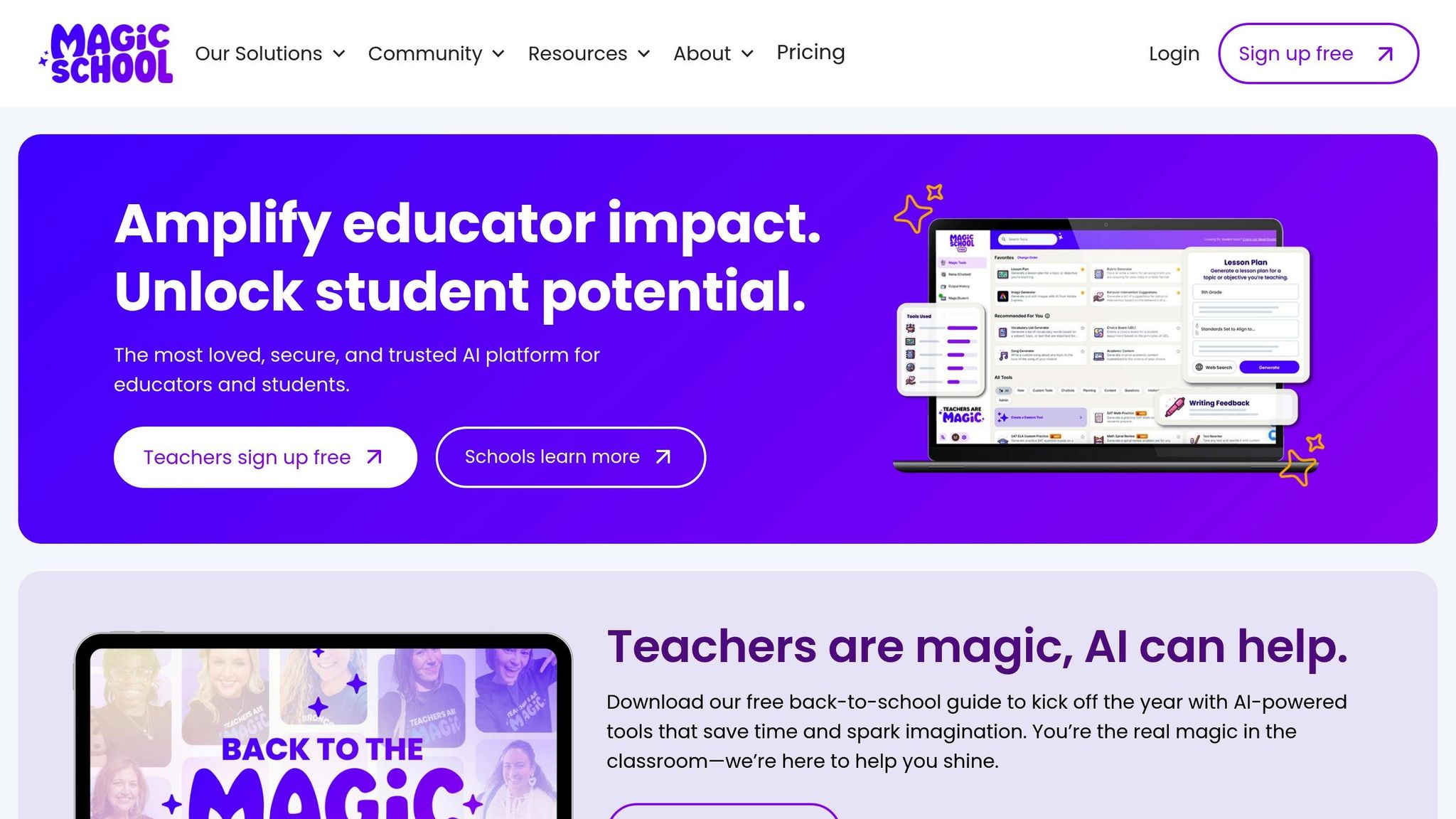
MagicSchool.ai steps in as a dynamic tool for both educators and students, offering tailored solutions to enhance teaching and learning experiences. This AI-driven platform aims to simplify lesson planning and provide personalized tutoring, making it a strong ally for back-to-school preparation.
Core Features
MagicSchool.ai equips teachers with tools to design lesson plans, assessments, and learning materials that cater to different learning styles. For students, it provides real-time feedback and clear, step-by-step explanations to tackle tough subjects. The platform also includes collaboration features, allowing teachers to track student progress and address challenges promptly - perfectly aligning with the demands of today’s classrooms.
Pricing
Offers a flexible pricing model, including a free tier and premium subscription options.
Supported Subjects
Covers a wide range of subjects, including language arts, social studies, STEM, and foreign languages. It also provides resources for crafting engaging assignments and discussion prompts that suit various curricula and grade levels.
Accessibility
MagicSchool.ai prioritizes inclusivity with features like text-to-speech options and customizable interface settings for users with visual needs. Its mobile-friendly design ensures educators and students can access its features on smartphones and tablets, making learning accessible anytime, anywhere. This focus on adaptability underscores its commitment to breaking barriers in education.
sbb-itb-212c9ea
5. Khanmigo (by Khan Academy)
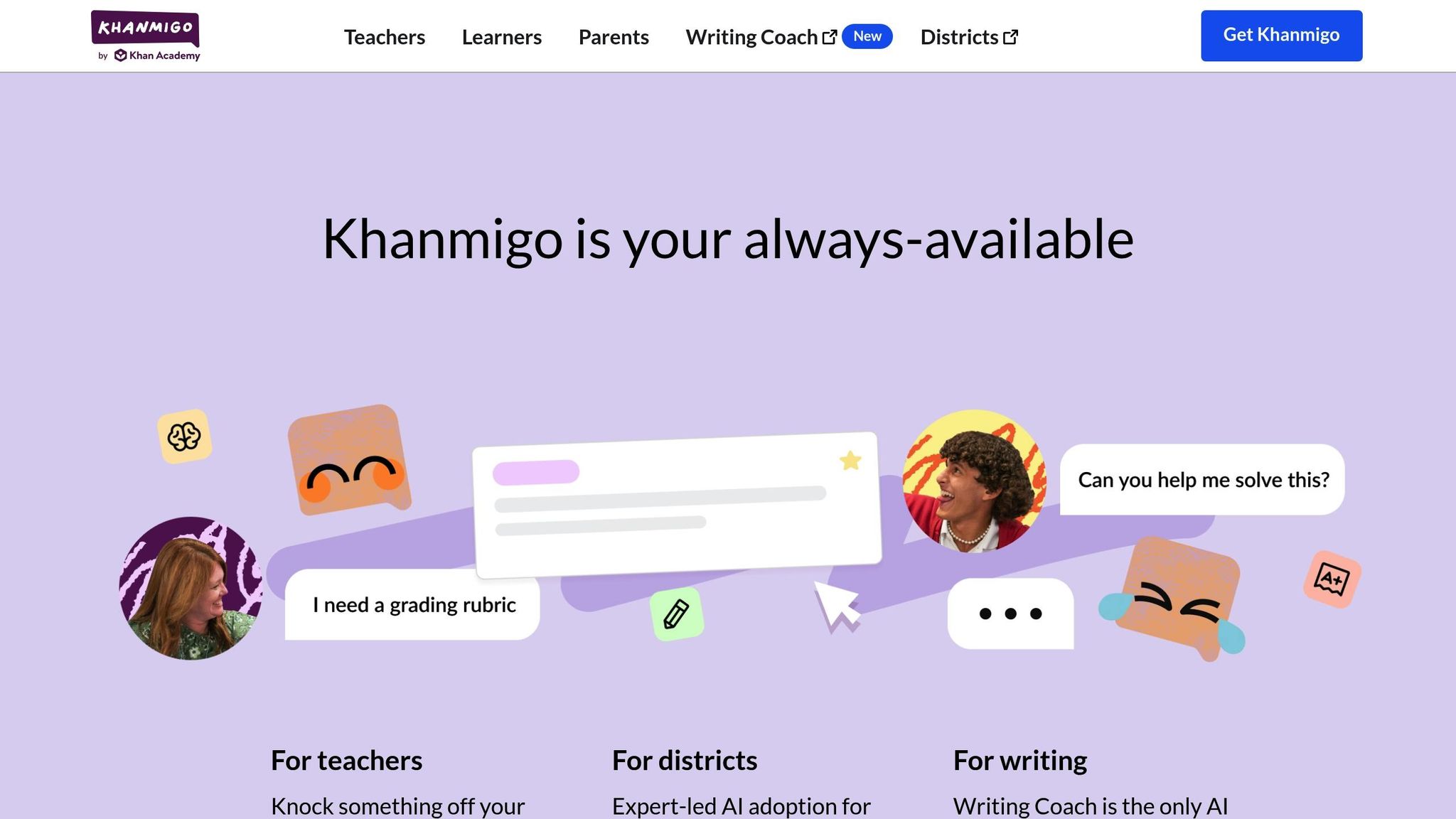
Khanmigo builds on Khan Academy's reputation to deliver a personalized, AI-driven tutoring experience. This digital tutor reshapes traditional learning by offering interactive conversations and real-time guidance tailored to each student's unique pace and learning style.
Core Features
Khanmigo acts as a conversational AI tutor, guiding students step-by-step rather than simply handing over answers. Using the Socratic method, it encourages students to think critically and discover solutions on their own. Students can discuss math problems, writing assignments, or dive into complex topics across various subjects in a natural, conversational way.
The AI integrates smoothly with Khan Academy’s vast library of exercises and instructional videos. When a student struggles, Khanmigo suggests targeted practice sessions and provides detailed, step-by-step explanations. For writing tasks, it assists with brainstorming, refining ideas, and improving composition skills through interactive feedback.
Teachers benefit too, with classroom management tools that track student progress and highlight common challenges. Educators can see how students interact with the AI and pinpoint topics that may need extra attention during lessons. This seamless integration supports a broad curriculum, fostering a more interactive and engaging learning environment.
Supported Subjects
Khanmigo covers a wide range of subjects:
- Mathematics: From basic arithmetic to advanced calculus, including algebra, geometry, and statistics.
- Science: Subjects like biology, chemistry, physics, and earth science, with interactive problem-solving for deeper understanding.
- English language arts: Support for reading comprehension, essay writing, and grammar improvement.
- Social studies: Topics like history, civics, and economics, allowing students to explore historical events or economic principles through discussions.
- Computer programming: Building on Khan Academy’s coding curriculum, it provides coding guidance and debugging help.
Accessibility
Khanmigo is designed to be inclusive, offering features that cater to diverse learning needs. It supports screen readers and keyboard navigation for visually impaired students. Options like adjustable text sizes and high contrast modes ensure content is easy to read for users with different visual requirements.
The platform accommodates various learning styles by providing both text-based and visual explanations for challenging topics. Students can request alternative explanation methods if one approach doesn’t resonate with them. Additionally, mobile optimization ensures that students can access Khanmigo on smartphones and tablets, allowing them to continue learning wherever they are.
6. Tutor AI
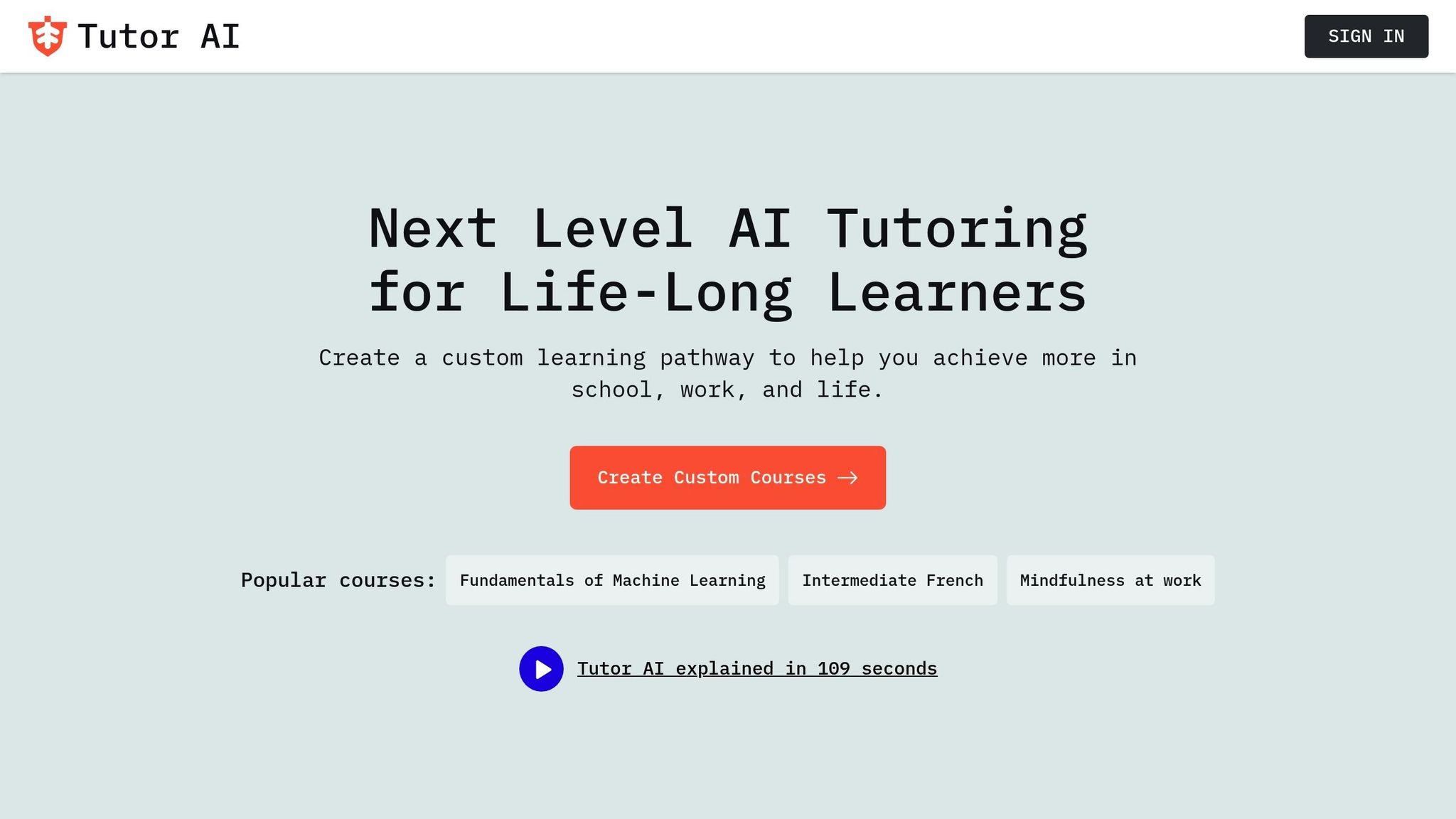
Tutor AI takes a unique approach to making elementary math learning more approachable and enjoyable for kids aged 5-11. This platform is designed specifically for the K-5 math curriculum, combining smart technology with interactive teaching methods to help young learners grasp math concepts in a fun and engaging way.
Core Features
Tutor AI uses a mix of personalized lessons, instant feedback, and interactive tools to create a rich learning experience. Its visual design, spoken instructions, and patient guidance make it especially helpful for kids who are just starting to read or those with different learning needs. By moving beyond traditional text-heavy methods, the platform ensures that all students can understand and work through math problems effectively.
The system adapts in real time, tracking each child’s progress and adjusting the difficulty of lessons to keep them challenged - without causing frustration. For advanced learners, it offers opportunities to explore more complex topics at their own pace.
Pricing (USD)
Tutor AI offers several pricing plans to fit different family sizes and budgets:
| Plan Type | Duration | Price | Key Benefits |
|---|---|---|---|
| Individual | Monthly | $45.00/month | Access for 1 child |
| Individual | Annual | $29.00/month ($348/year) | Save 28%, access for 1 child |
| Individual | Lifetime | $999 (one-time) | Permanent access for 1 child |
| Family | Monthly | $70.00/month | Access for up to 10 students |
| Family | Annual | $33.33/month ($400/year) | Save 65%, access for up to 10 students |
| Family | Lifetime | $1,499 (one-time) | Permanent access for up to 10 students |
A 7-day free trial is included with all plans, so families can explore the platform before making a long-term commitment. The family plans are particularly appealing for households with multiple children or for educators teaching small groups.
Supported Subjects
Tutor AI sticks to what it does best: math education for elementary students. The curriculum covers all the key areas of K-5 math, such as basic arithmetic, number sense, geometry, measurement, and early algebra.
While the lessons meet standard educational guidelines, the platform also caters to advanced learners by introducing concepts typically reserved for higher grades. By staying focused on math, Tutor AI ensures that its resources are used to deliver in-depth, high-quality instruction.
Accessibility
Accessibility is a top priority for Tutor AI. Its visual interface minimizes the reliance on reading, while spoken instructions make the material approachable for kids who may struggle with text-based learning.
The platform’s flexible, multi-sensory design allows children to interact with math concepts in ways that suit their individual learning styles. Whether a child learns best through visuals, audio, or hands-on activities, Tutor AI adapts to meet their needs. This thoughtful approach opens the door for all students - especially those who may find traditional classroom settings challenging - to succeed in math. It’s a testament to how AI can make learning more inclusive and effective.
7. Socratic
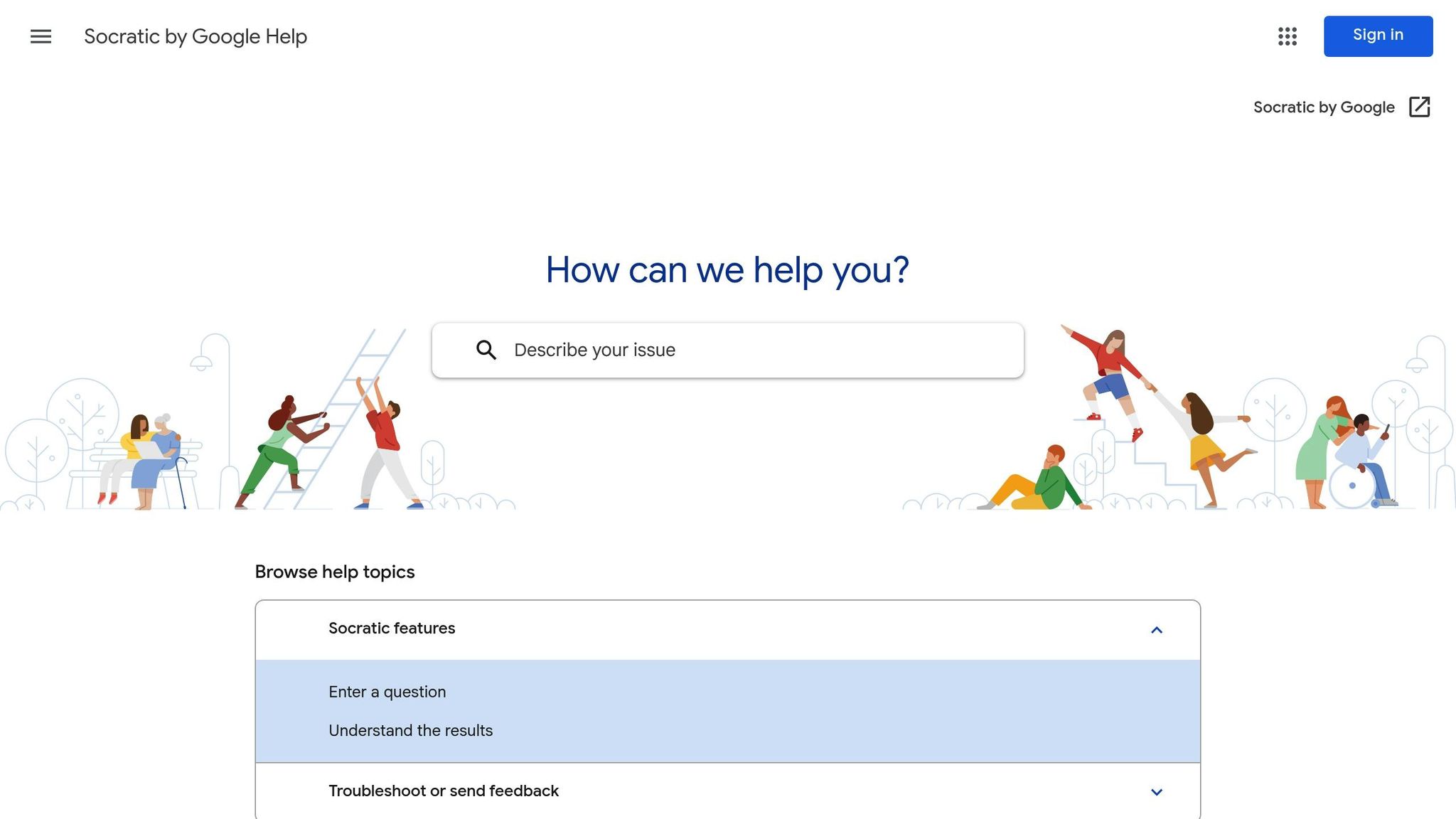
Socratic is a free mobile app designed to help students tackle homework problems using AI-powered visual recognition. Similar to Tutor AI's specialized focus, Socratic broadens its reach by analyzing images to provide instant academic support across various subjects.
Core Features
One standout feature of Socratic is its camera-based problem-solving tool. Students can snap a photo of their homework question, and the app's AI processes the image to deliver step-by-step solutions. It also provides curated learning materials from trusted sources like Khan Academy, study guides, and interactive explanations.
What sets Socratic apart is its ability to cater to different learning preferences. Whether through videos, written guides, or interactive content, students can choose the format that works best for them. The app also supports voice search and camera input for asking questions naturally, and it stores conversation history so students can revisit past explanations to reinforce their understanding.
Pricing (USD)
Socratic is completely free, making it accessible to students regardless of their financial situation. Supported by Google as part of its commitment to education, the app ensures that cost is never a barrier to learning.
Supported Subjects
Socratic covers a wide range of subjects, excelling in mathematics - from basic algebra to advanced calculus - and science topics like biology, chemistry, physics, and earth science.
It doesn’t stop at STEM. The app also supports literature, history, economics, and social studies. Its camera recognition technology is particularly effective for subjects involving visual elements, such as equations, diagrams, and charts.
Accessibility
Accessibility is a key focus for Socratic, thanks to its user-friendly mobile interface and multiple input options. The camera feature is especially helpful for students who may struggle with typing due to motor difficulties.
The app is compatible with both iOS and Android devices, ensuring it works on most smartphones and tablets. For students with visual impairments, the app includes alt-text for visual content and supports screen readers.
Another valuable feature is its offline mode, which allows students to revisit previously accessed explanations without needing an internet connection. This is especially useful for those in areas with limited connectivity or for studying on the go.
Advantages and Drawbacks
AI tutoring platforms juggle cost, accessibility, personalization, and performance, offering a mix of benefits and trade-offs that vary across leading options.
One major advantage is affordability. Many platforms use free or mixed-premium models, making quality education more accessible without the hefty price tag of private tutoring. That said, pricing structures can differ significantly, so it’s important to consider your budget when comparing options.
Personalization is another strong point. Adaptive algorithms provide tailored support, which can be a game-changer for students who need a customized approach. However, these advanced features often come with a steeper learning curve or added expenses. It’s worth weighing whether the initial effort or cost is justified by the long-term benefits.
The range of subjects covered also varies. Some platforms offer an extensive selection across multiple topics, while others specialize in specific areas, diving deeper into niche subjects. Many also include diverse content formats - like text, videos, and interactive tools - catering to different learning preferences and styles.
Technical accessibility plays a big role in usability. Platforms with mobile-first designs or features like visual recognition are easier to use in various settings. On the flip side, tools designed primarily for desktop use or requiring a strong internet connection can pose challenges in areas with limited device access or connectivity.
Other considerations include integration with learning management systems, ease of navigation, and data privacy. Ensuring that student information is collected and stored securely is critical for meeting the expectations of families and schools. Additionally, real-time responsiveness becomes especially important during busy homework or exam periods. These factors highlight the diverse strengths and challenges of AI tutoring platforms.
Final Thoughts
AI tutoring platforms are transforming education for students across the United States by offering tailored and flexible learning solutions. The seven platforms discussed showcase a variety of approaches - ranging from Cognispark AI’s broad subject coverage to Socratic’s emphasis on visual problem-solving - each designed to address specific educational challenges.
A key advantage of these platforms is their ability to improve access to quality education. By offering free plans or affordable subscriptions, AI tutoring services provide personalized learning support at a fraction of the cost of traditional tutoring, making them more accessible to a wider audience.
For students, these tools offer immediate feedback and are available 24/7. Their adaptive algorithms quickly identify learning gaps and adjust difficulty levels, providing a level of personalization that often surpasses conventional methods.
Educators and parents also benefit from these platforms. AI tutors handle routine questions and reinforce foundational skills, allowing teachers to focus on more in-depth discussions and creative activities in the classroom. Progress tracking tools further empower both parents and educators by offering real-time insights into student performance and highlighting areas that need extra attention.
Choosing an AI tutor should depend on the student’s specific needs. For example, students requiring extra help in STEM subjects might prefer the math and science strengths of Mindgrasp AI or Socratic. On the other hand, those looking for writing assistance might find Coursebox or Tutor AI more suitable. Families can explore free trials to ensure the platform aligns with their learning preferences before committing, making the transition to AI tutoring smoother and more effective.
Starting with a basic AI tutor and expanding its use as needed can significantly enhance learning outcomes. As the 2025 school year progresses, these tools are becoming an essential part of academic success for many students.
FAQs
How do AI tutors compare to traditional tutors in terms of cost and effectiveness?
AI tutors present a cost-effective and time-saving alternative to traditional tutoring. While hiring a traditional tutor can cost anywhere from $25 to $80 an hour, AI-powered platforms typically charge just $15 to $30 per month for unlimited access. This pricing makes AI tutors an attractive option for families looking to save money without compromising on educational support.
When it comes to results, research indicates that AI tutors can cut learning time by 40–60% while boosting skill mastery and keeping students engaged. These platforms adjust to each student’s unique needs, delivering tailored support that often leads to faster and more effective learning. For many students, the combination of lower costs and personalized help makes AI tutors a strong alternative to traditional tutoring options.
What should parents look for when selecting an AI tutoring platform for their child?
When selecting an AI tutoring platform, parents should focus on tools that offer strong privacy safeguards and transparent data policies. This ensures their child’s personal information remains safe. Features like parental controls and monitoring options are also crucial, as they allow parents to track progress and maintain a secure learning space.
It’s equally important to choose platforms that align with your child’s age and educational level. Opt for tools designed to match their learning style and provide constructive feedback, helping them advance academically in a supportive way.
How do AI tutoring platforms protect student privacy and ensure data security?
AI tutoring platforms place a strong emphasis on protecting student privacy and securing data, employing advanced methods to keep information safe. Trusted platforms often use encryption to secure data both during transmission and while it's stored, making it inaccessible to unauthorized individuals. They also adhere to privacy regulations like FERPA, which set strict guidelines for managing student information.
To enhance data protection, schools and parents should collaborate with platforms that clearly outline their data policies and practices. Setting clear guidelines for AI usage and asking vendors specific questions about their security protocols can provide added assurance that student information is well-protected.



